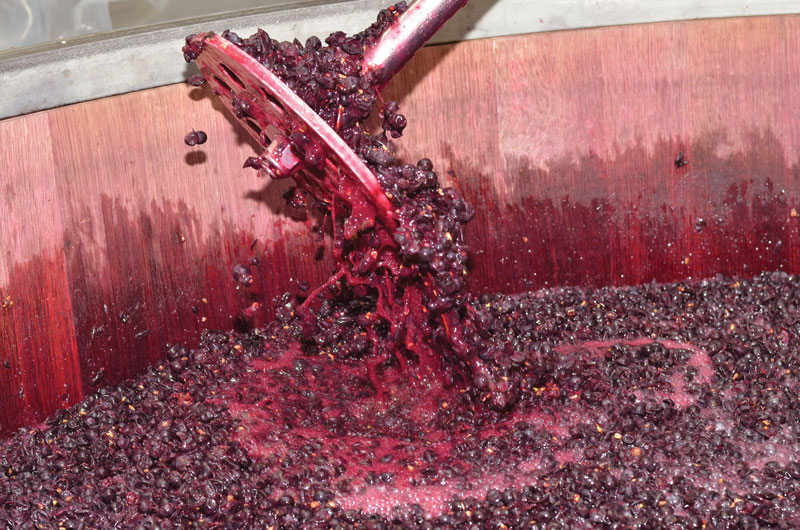That is a wonderful question! It’s estimated that it takes anywhere from 2–10 gallons (8–38 L) of water to make a gallon (4 L) of wine. Most of that estimate is for sanitation but there’s no doubt a little bit gets mixed up in the wine when we rehydrate our yeast or dissolve tartaric acid. Sometimes we need to add a lot more to account for high sugar levels; depending on the yeast you use, it’s harder to ferment something to dryness over 25 °Brix.
Does the water you use in winemaking matter? I say yes indeed, especially for two important applications: Yeast rehydration and kit concentrate dilution. In the case of the former, you really need to make sure the water has absolutely no chlorine in it (which can inhibit sensitive yeast) and it does need to contain some trace minerals like magnesium, which helps support healthy yeast growth. In the case of the latter, you will be adding a large volume of said water to dilute the grape concentrate that comes in the kit so if you have terrible tasting water it could be reasoned it might adversely affect the taste of the final wine.
If you have to add a significant amount of water to your wine for any reason, the quality of water will definitely matter. Water in our homes typically comes from a municipal source (tap water) or from wells on our properties. The problem with tap water is that it usually contains chlorine, which needs to be filtered out with an activated charcoal or carbon filter before being used for winemaking. You can find these at hardware or water supply stores. The problem with well water, however, is not the chlorine but the potential bacteria, heavy metals and other contaminates. I recommend a 0.45 micron filter (using your pre-bottling wine filter would work) and an activated charcoal filter to remove impurities. If you really want to know what’s in your water, you might want to try filtering some of your well water and then sending it out to be plated for bacteria and for heavy metal analysis.
Water softeners add another wrinkle, namely because they tend to add a lot of sodium. This can help well water taste better but also can disturb yeast during the hydration process and wreak havoc with their cellular membranes. If you have a water softener I recommend bypassing it or turning it off so you’re not getting all the added salts.
Here are some pros and cons of types of water, and what to do for your unique situation:
Municipal/tap water:
Pros: Usually bacteria-free and has an acceptable taste.
Cons: Contains chlorine that can inhibit yeast, especially during the sensitive rehydration phase.
To Do: Pass through an activated charcoal/carbon filter.
Well water:
Pros: Can taste great, locally sourced.
Cons: May not taste good. Potential for bacteria and heavy metal or mineral contamination.
To do: Pass through an activated charcoal/carbon filter and 0.45 micron filter to remove any bacteria.
Softened water:
Pros: Acceptable taste.
Cons: High sodium content that can interfere with yeast and the “good” bacteria you want in winemaking.
To do: Bypass your water softening system and treat as per above depending whether it is well water or municipal water.
Distilled water:
Pros: No taste, no bacteria.
Cons: No minerals at all, which the yeast need in small amounts for healthy fermentation. It may be treated with chlorine.
To do: It is fine for rinsing labware, but not recommended for use in winemaking.
Bottled “spring” water:
Pros: Acceptable taste, low possibility of microbes.
Cons: May have been treated with chlorine, hard to know where it came from.
To do: Pass through an activated charcoal filter if there is a possibility it has chlorine.


